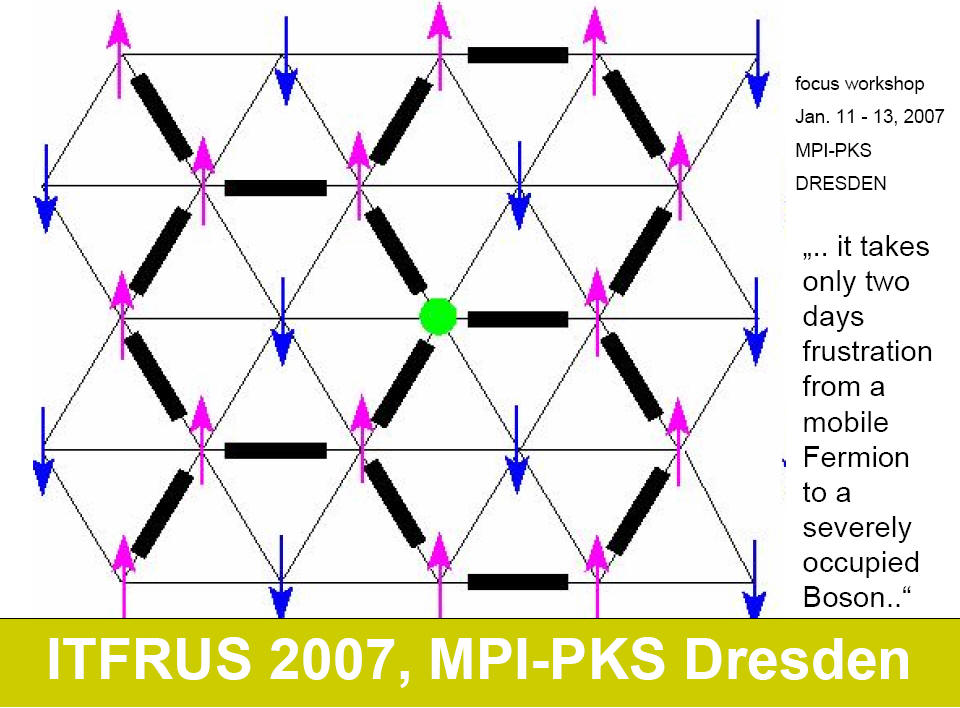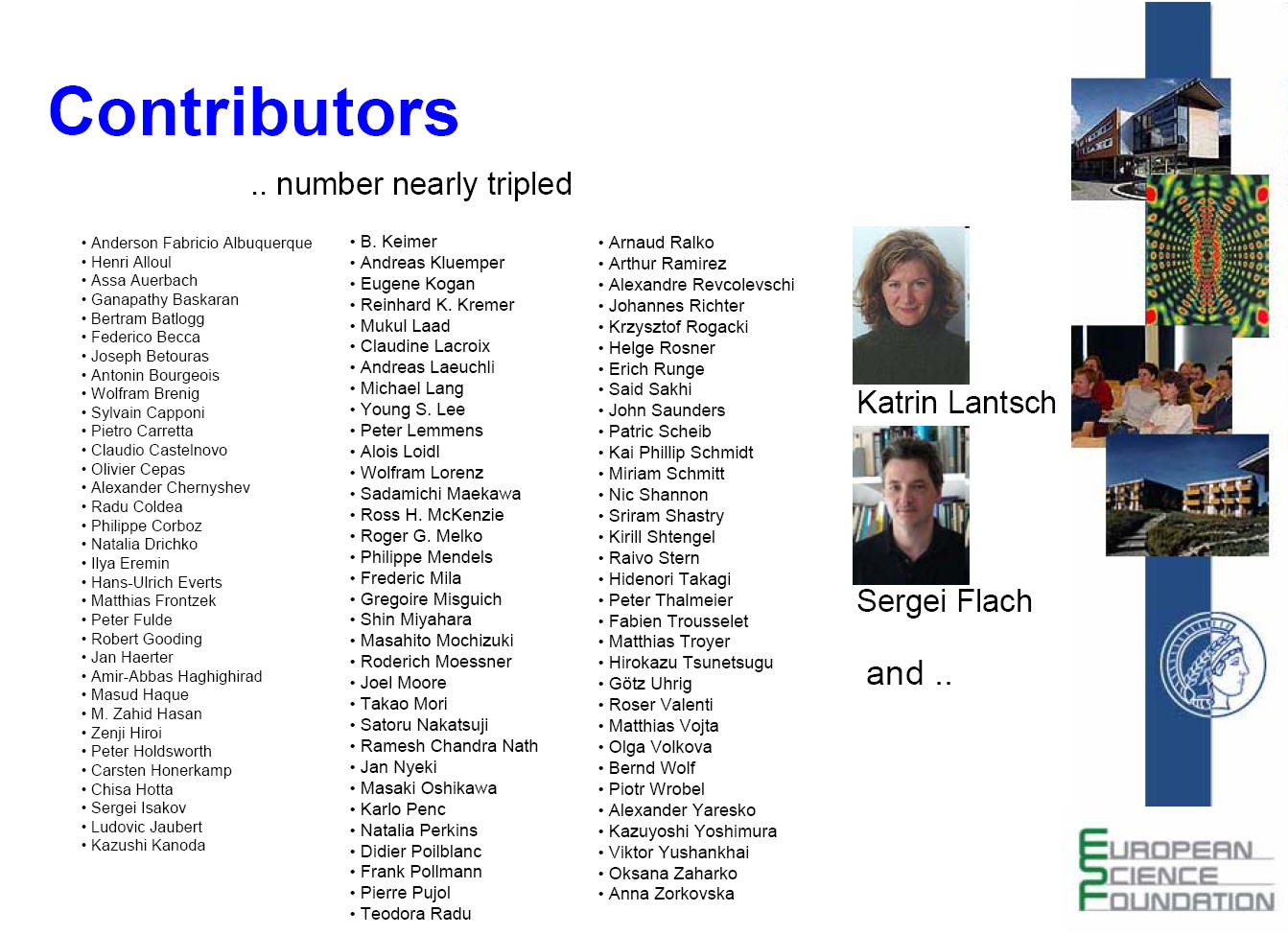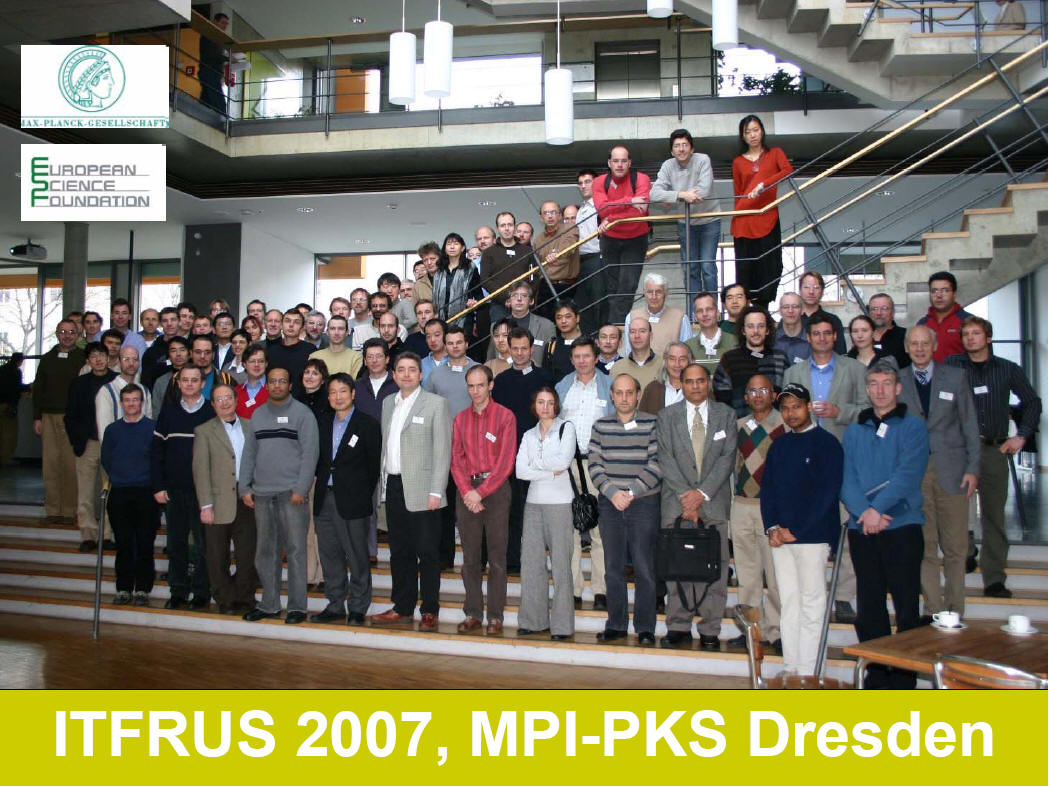|
Summary
The workshop was organised within
the scientific program Highly Frustrated Magnetism (HFM) supported
by the European Science Foundation (ESF) and the Max-Planck
Institute for the Physics of Complex Systems (MPI-PKS) Dresden. The
organizers were: P. Fulde (Dresden, Germany), Z.
Hiroi (Tokyo, Japan), P. Lemmens
(Braunschweig, Germany), and R. Moessner (Oxford,
United Kingdom). The local organization of the workshop was
performed by K. Lantsch from the MPI-PKS Dresden, Germany
The initial planning for the workshop
and first announcement happened during the HFM steering committee
and the first workshop held in La Londe les Maures in France,
November 2005. The focus on a restricted set of topics allowed
adding well-established experts in the field, both contacted
directly by the organizers and from the numerous applications. A
webpage for the workshop was set-up and updated until the workshop
started: http://www.mpipks-dresden.mpg.de/~itfrus07/ with a brief
report at http://www-public.tu-bs.de:8080/~plemmens/esf-hfm/hfm-workshop-2007.html
The topic 'frustrated systems with
itinerant aspects' was divided into several subtopics that where
represented by key speakers in addition to posters. These were:
cobaltates, triangular organics, itinerant pyrochlores, spinels,
frustration and ordering, quantum criticality, bosons and
supersolids, fundamental mechanisms, checkerboard physics. Material
science, modelling as well as theoretical aspects were discussed.
The workshop had 96 participants (36
oral, 63 poster contributions and one concluding remark). The
organizers tried to bring together a mix of young scientists on the
level of PhD students, and postdocs together with senior
researchers. The interdisciplinary approaches of the workshop lead
to the additional advantage of a mutual exchange about all material
related aspects.
All scientific activities as well as
lunch and dinner were organized in the central building of the
MPI-PKS in Dresden. This led to close contact and intensive
discussions between the participants, and optimised the use of the
time available.
Description of the
scientific content
Materials physics
topics:
The topic cobaltate was represented
using the experimental techniques neutron scattering (Keimer, Lee),
photo emission (Hasan), NMR (Alloul, Yoshimura), preparation and
thermodynamic investigations (Yoshimura) and theory (Maekawa, Eremin,
Mochizuki). The compound NaxCoO2 is one of the
novel systems that motivated this workshop due to its exceptional
ground state and transport properties. Especially noteworthy is the
very large thermopower that reaches application relevant magnitudes.
The observation of unconventional superconductivity is an additional
highlight and motivation. Strong activities exist in Japan, where
the system has been established. In France important spectroscopic
investigations have been performed. In Germany activities started
with one of the organizers at the MPI-FKF in Stuttgart and recently
spread out to the TU Braunschweig in the frame of a project
supported by the German Science Foundation (DFG).
The case of triangular organics is
similar with respect to the strong position of Japan and the
prospects of the materials. In our workshop thermodynamic aspects
and the phase diagram have been discussed by Lang and Kanoda.
Theoretical modelling relevant for these materials is more
widespread. All important aspects were discussed by Baskaran and
McKenzie. In general the interest in organic materials with
competing interactions is recently growing in Europe.
Pyrochlores and spinels are two classes
or families of compounds characterized by wellknown and
long-investigated crystallographic structures. These families of
compounds show an enormous variety of compositions and physical
properties. The interplay of magnetism (or other long range ordered
states) and competing interactions is more recently in the centre of
interest. Accordingly, the speakers touched different aspects
ranging from unconventional ground states to more materials related
or application based interest. The respective seminars touched
electron-phonon coupling and superconductivity (Hiroi),
multiferroicity (Loidl), metal-insulator transitions (Kremer,
Takagi), Kondo-type physics (Nakatsuji) and different theoretical
approaches (Valenti, Lacroix, Tsunetsugu) with an emphasis on
unconventional transport properties. During the workshop it has been
widely accepted that both the pyrochlores and the spinels will be of
increasing importance in the field of frustrated magnetism.
Conceptual foundations:
Additional emphasis was placed on
addressing, mainly from a theoretical vantage point, a range of
fundamental issues raised in the context of itinerant frustration.
These included questions as fundamental as the origin of magnetic
behaviour, with a talk by Oshikawa demonstrating the presence of
ferromagnetism by statistical transmutation, and one by Shastry on
kinetic antiferromagnetism. A classification of topological
insulators was discussed by Moore. Vojta's talk considered the
possibility of dimensional reduction near a critical point in the
framework of an RG treatment.
The nature of ordering in the presence
of frustration was also extensively discussed. Emphasis was placed
on the interplay of magnetic with 'ferroic' ordering behaviour by
Ramirez, while Mila addressed field-driven crystallisation phenomena
manifesting themselves in magnetisation plateaux.
A pair of talks (Becca, Poilblanc) was
devoted to different aspects of dimer model physics. These models
are used to describe the properties singlet-dominated magnetic
phases. One aspect concerned the details of the ordering behaviour
of the triangular dimer model, the phase diagram of which includes
not only a topological liquid but also a complex plaquette RVB
state. The other dealt with the problem of doping such models -- a
topic of great interest due to their provenance from
high-temperature superconductivity. The related topic of physics on
the checkerboard lattice -- one of the most highly frustrated
lattices in d=2 - was given much emphasis, including talks on
connections with the lore of high-energy physics (Fulde), as well as
on its peculiarities of ordering (Penc) and Fermionic
quantum-dynamics (Shtengel). This was backed up with a talk on
numerical studies on 1-d ladder-type systems (Brenig).
Finally, the workshop reached out to
closely related topics of interest to the Helium and cold atom
communities. Saunders discussed the properties of Helium films
adsorbed on different substrates. On the topic of supersolid phases
and Bosons in magnetic fields, lattice models and their ordering
properties were discussed by Troyer, Melko and Auerbach.
Impact of the event
As discussed in the preceding
paragraphs, the combination of competing interactions with itinerant
aspects is a very strong and rapidly developing field which links
fundamental conceptual, modelling as well as materials related
questions. Given the well-focussed topic of the workshop, it was
possible to accomodate almost all of the applications for
participations (application to the workshop was open to everyone).
This gave a large number of younger participants on the student and
postdoc level the chance to interact with world-renowned experts in
the field on the highest scientific level. The excellent local
organization of the workshop by K. Lantsch and the team at the
MPI-PKS helped to prepare a very productive environment. The
importance of the meeting was also highlighted by the large number
of steering committee members present
(C. Lacroix, P. Lemmens, Ph. Mendels, F. Mila, R.
Stern, and K. Penc),
as well as by a strong participation from outside Europe, despite
the short duration of the workshop.
A copy
from the closing remarks at Dresden:



The next events within
the European Science Network:
|